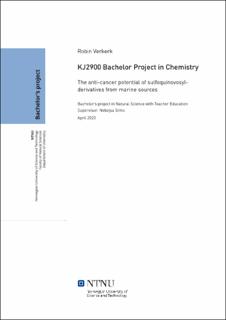| dc.description.abstract | Cancer is among the deadliest diseases known to man. What makes cancer more challenging to treat than other diseases is the fact that it, by its very nature, undergoes rapid and frequent mutations, making every case – to greater or lesser extent – unique. As a result, treatment that may prove effective in one patient may not be as effective in other patients. Cancer may also develop in virtually any part of the human body, often rendering surgical options infeasible. Consequently, it is desirable to have as many different available treatments as possible, not only in order to have contingencies should a specific treatment prove ineffective, but also in order to treat cancer more efficiently by using various treatments in conjunction with one another. Many anti-cancer drugs have been derived or extracted from natural sources, and nature remains a field of focus for finding new cytotoxic drugs or inhibitors that can help in the fight against cancer. Recently a group of sulfoquinovosyl-derivatives from marine sources have been found to have anti-cancer properties in a number of ways, and could potentially make effective new anti-cancer drugs [1]. | |
